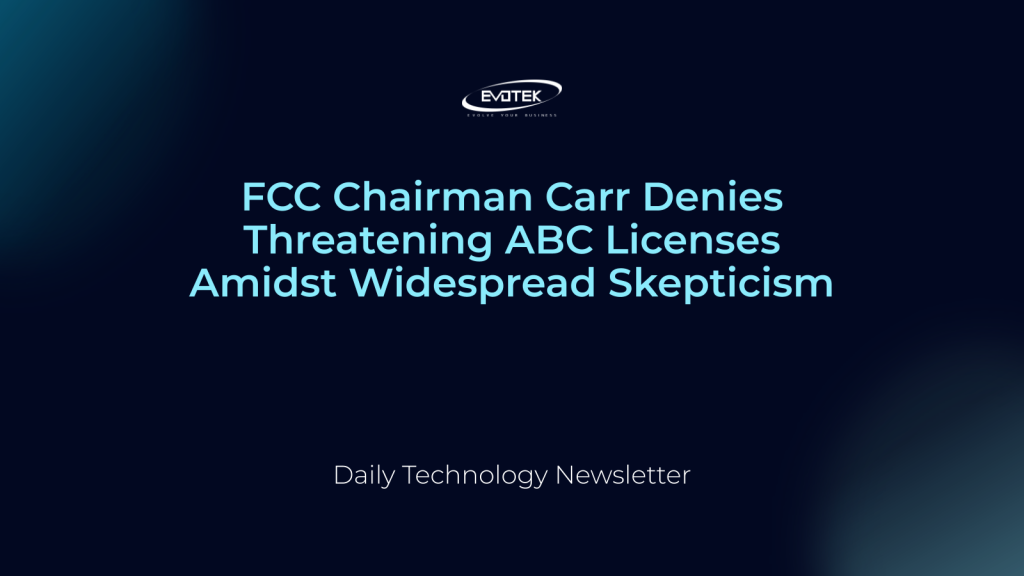Federal Communications Commission Chairman Brendan Carr is attempting to distance himself from accusations that he threatened to revoke television licenses from ABC affiliates if Disney did not suspend comedian Jimmy Kimmel. Despite Carr’s recent denials, a significant body of evidence, including his own prior statements and strong reactions from lawmakers and legal experts, suggests otherwise.
During an on-stage interview at the Concordia Summit, Carr asserted, “There’s a lot of Democrats out there that are engaged in a campaign of projection and distortion.” He specifically dismissed claims that the FCC threatened Disney and ABC over Kimmel, stating, “that did not happen in any way, shape, or form.” Carr depicted his role at the FCC as that of a dispassionate arbiter, merely outlining a hypothetical process for adjudicating complaints of “news distortion.”
The Contradiction: What Carr Said Previously
Carr’s current narrative, however, faces scrutiny when compared to his earlier, more assertive remarks. Last week, following Kimmel’s monologue which angered conservatives, Carr explicitly stated, “We can do this the easy way or the hard way,” and urged Disney to “take action” on Kimmel, warning of “additional work for the FCC ahead.” He also directly called upon local TV station owners to “preempt” Kimmel’s show, suggesting they risked “fines or license revocations from the FCC” if they continued to air content he described as “some of the sickest conduct possible.”
Following Carr’s initial comments, Disney suspended Jimmy Kimmel Live! before reinstating it amidst public outcry. While Kimmel’s show is back on many ABC affiliates, stations owned by Nexstar and Sinclair have notably replaced the program with other content.
Bipartisan Backlash from Capitol Hill
The perceived threat from Carr drew sharp criticism not only from Democrats but also from prominent Senate Republicans. Senator Ted Cruz (R-Texas) likened Carr’s “easy way or the hard way” comment to a scene “right outta Goodfellas,” while Senator Rand Paul (R-Ky.) deemed Carr’s actions “absolutely inappropriate” and outside his purview. Even Senate Minority Leader Mitch McConnell (R-Ky.) echoed Cruz’s sentiment, emphasizing that the government “shouldn’t be getting involved” in such matters, citing First Amendment concerns.
Legal Experts Affirm “Explicit Threat”
Legal analysts from both libertarian and right-leaning institutions also interpreted Carr’s statements as a clear threat. Thomas Berry of the Cato Institute described it as “a fairly explicit threat to punish Disney if they didn’t take Jimmy Kimmel off the air.” Daniel Lyons of the American Enterprise Institute (AEI) called it “part of a long, unfortunate FCC tradition of ‘regulation by raised eyebrow,’ where informal threats shape media behavior without formal action.”
Carr’s Alternative Narrative: Organic Pressure
Chairman Carr has attempted to reframe the situation, suggesting that local TV stations independently chose to push back against national programmers like Disney. He argued that “local TV stations for the first time in a long time stood up and said, ‘We don’t want to run that program,'” and that “Disney on its own made the business decision.”
However, this perspective overlooks the fact that the primary pushback came from two major station owners, Sinclair and Nexstar, both of whom have significant business dealings, including pending mergers and acquisitions, awaiting FCC approval. Sinclair owns 38 ABC stations, and Nexstar operates 28. In contrast, other large affiliate owners like Gray and Hearst planned to air Kimmel’s show as scheduled.
FCC Democrat Calls Out “Government Intimidation”
Anna Gomez, the sole Democrat on the Republican-majority FCC, voiced strong opposition to Carr’s actions. She previously warned that “billion-dollar companies with pending business before the agency” could be “vulnerable to pressure to bend to the government’s ideological demands.” Following Kimmel’s return, Gomez commended Disney for finding “its courage in the face of clear government intimidation,” and thanked Americans “from across the ideological spectrum who spoke loudly and courageously against this blatant attempt to silence free speech.”
The controversy continues to highlight the delicate balance between media regulation, corporate interests, and the fundamental principles of free speech, with FCC Chairman Carr’s actions drawing scrutiny from across the political and legal spectrum.

 日本語
日本語 한국어
한국어 Tiếng Việt
Tiếng Việt 简体中文
简体中文